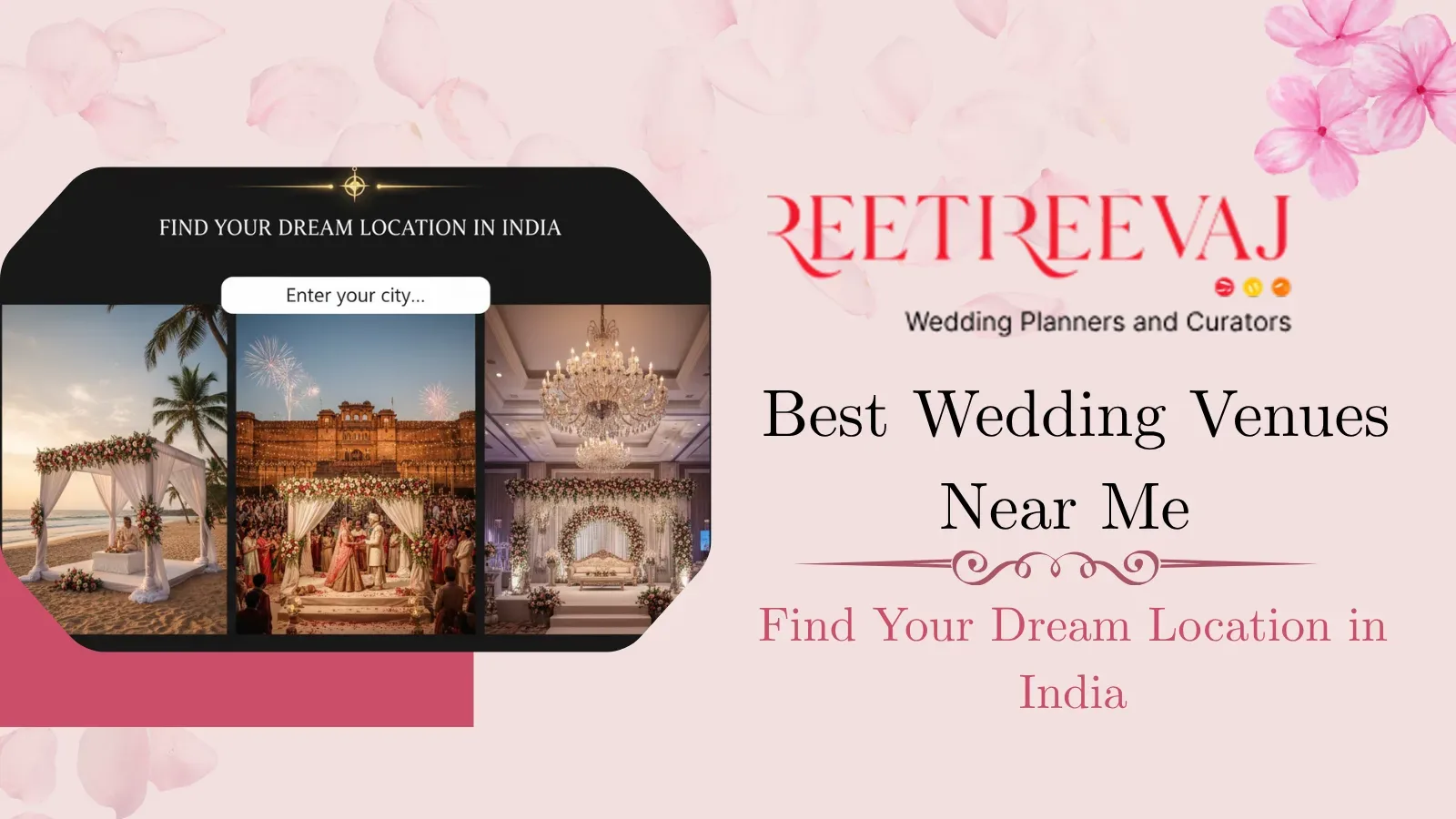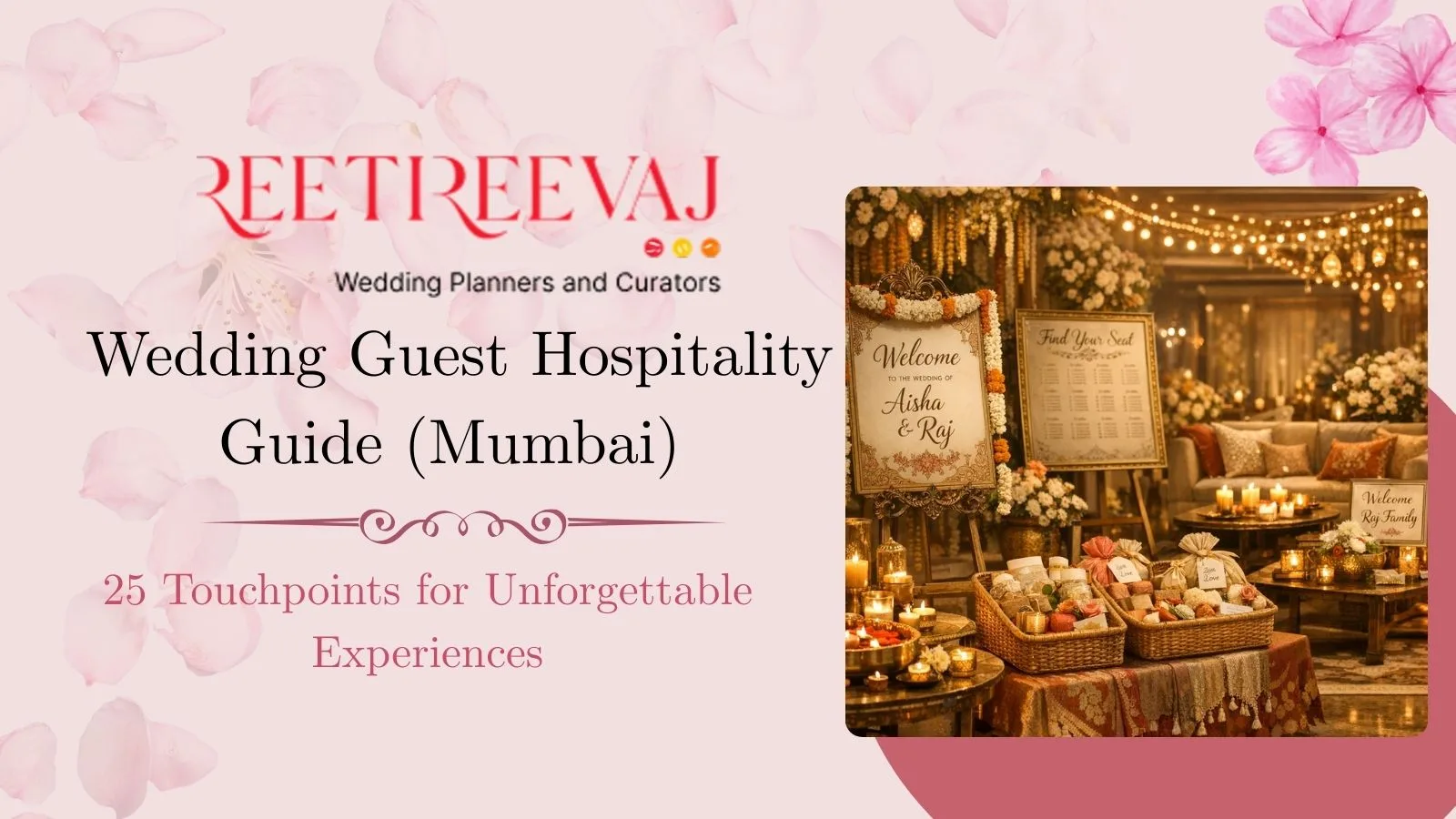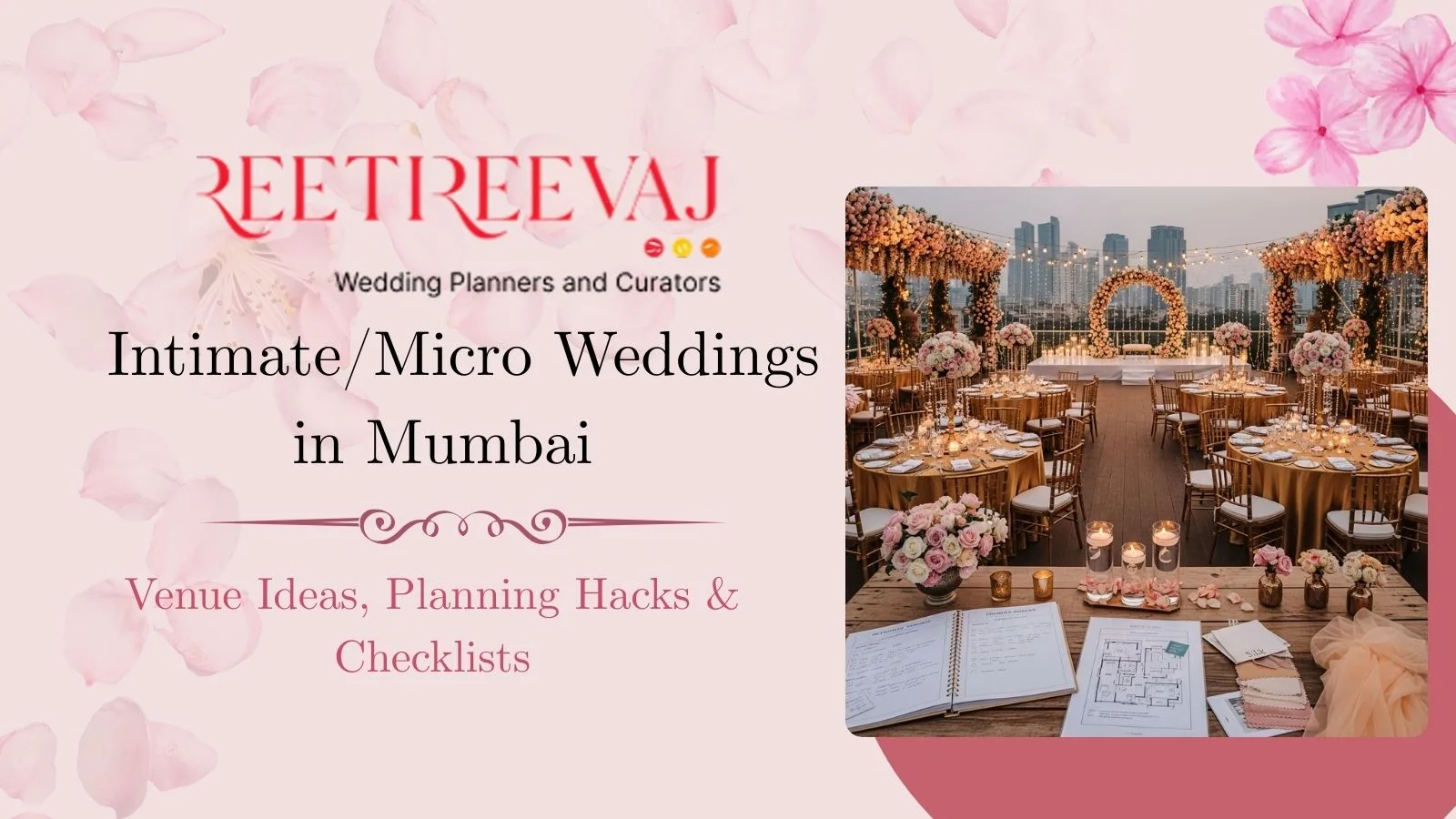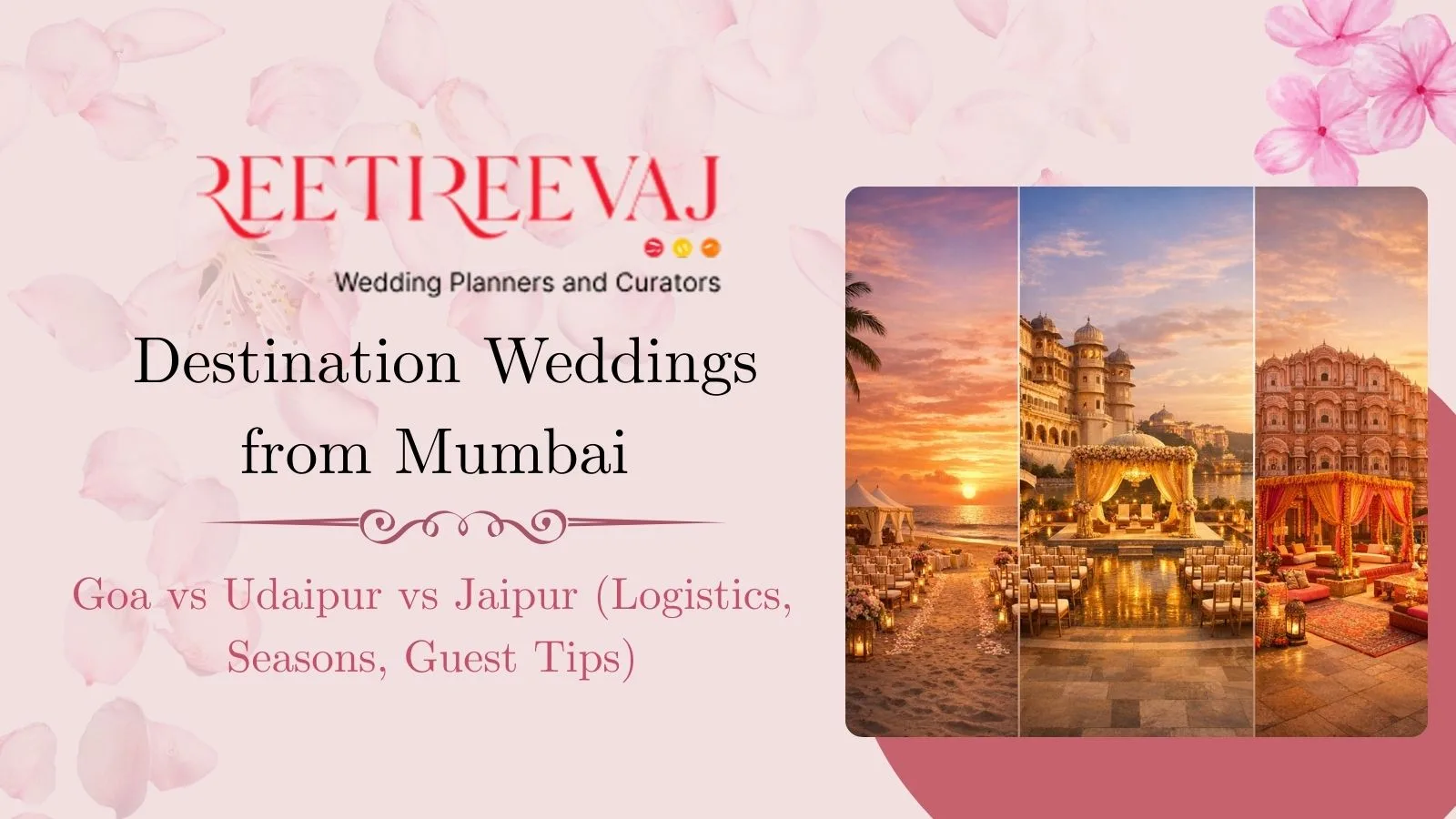
Written by Varsha Kasera, Founder of Reetireevaj – Mumbai’s Premier Wedding Planning Company Last Updated: October 11th, 2025
Searching “wedding venues near me” at 2 AM while scrolling through endless options? You’re not alone. Choosing the perfect wedding venue is one of the most crucial decisions you’ll make—it sets the tone for your entire celebration and often consumes 40-50% of your wedding budget.
The right venue isn’t just about beautiful photos. It’s about finding a space that reflects your love story, accommodates your guests comfortably, and creates memories that last a lifetime. Whether you’re dreaming of a palace wedding in Rajasthan, a beachfront ceremony in Goa, or an elegant banquet hall in your hometown, this comprehensive guide will help you discover and evaluate the best wedding venues near you.
Why Your Venue Choice Matters More Than You Think
Your wedding venue influences every other decision in your planning process. The location determines your guest list accessibility, the season affects your décor choices, and the venue’s style shapes your entire aesthetic direction.
Beyond aesthetics, the right venue provides logistical advantages that make planning smoother. Venues with experienced event teams, flexible policies, and comprehensive amenities reduce stress and often save money by bundling services. Poor venue choices, conversely, can create cascading problems: limited vendor access, restrictive timelines, hidden fees, or guest discomfort.
The Venue Selection Timeline
Most couples book their venue 12-18 months before their wedding date, especially for peak season celebrations (October through March in India). Prime venues in popular locations book even earlier—sometimes 18-24 months in advance for specific dates.
Starting your venue search early provides leverage for negotiations, ensures date availability, and removes time pressure from your decision-making. However, if you’re planning with a shorter timeline, don’t worry—many excellent venues maintain availability, and experienced planners like Reetireevaj can help you find hidden gems that others overlook.
Types of Wedding Venues in India
India’s diverse landscape offers an incredible variety of venue styles. Understanding different venue categories helps you narrow your search based on your vision, guest count, and budget.
Heritage and Palace Venues
Rajasthan’s palaces and heritage properties offer unmatched grandeur and historical elegance. These venues provide built-in drama—stunning architecture, intricate craftsmanship, and regal ambiance that requires minimal additional décor.
Best For: Couples seeking traditional elegance, destination weddings, and multi-day celebrations with 150-500 guests.
Considerations: Often located in specific regions (Udaipur, Jaipur, Jodhpur), require travel arrangements for guests, and command premium pricing. Many heritage venues have strict guidelines about décor modifications and vendor access.
Average Investment: ₹5 lakhs to ₹50 lakhs+ depending on property prestige, season, and guest count.
Luxury Hotels and Resorts
Five-star hotels provide comprehensive wedding services with experienced event teams, multiple venue options within one property, and accommodation convenience for guests. Their professional coordination and infrastructure handle everything from catering to technical requirements.
Best For: Couples prioritizing convenience, guest comfort, and professional event management. Ideal for 100-1000+ guests.
Considerations: Can feel less personalized than standalone venues, strict vendor policies (many require you to use in-house services), and premium pricing for peak dates.
Average Investment: ₹3 lakhs to ₹30 lakhs+ depending on city, property category, and services included.
Banquet Halls and Convention Centers
Purpose-built event spaces offer flexibility, substantial capacity, and blank-canvas possibilities. These venues work for couples who want creative control over their wedding design without venue architecture constraints.
Best For: Large guest lists (200-2000+), couples with specific design visions, and budget-conscious planning without compromising space.
Considerations: Require significant décor investment to transform the space, may lack charm of architectural venues, and need careful vendor coordination.
Average Investment: ₹1.5 lakhs to ₹15 lakhs depending on location, capacity, and inclusions.
Outdoor and Garden Venues
Farm venues, garden estates, and outdoor properties offer natural beauty, open-air celebration possibilities, and intimate ambiance. These venues photograph beautifully and provide flexibility for creative layouts.
Best For: Nature-loving couples, intimate weddings (50-300 guests), and those seeking relaxed, informal celebrations.
Considerations: Weather-dependent (require backup plans), limited infrastructure (may need to rent everything), potential logistical challenges, and seasonal availability.
Average Investment: ₹2 lakhs to ₹20 lakhs depending on property, services provided, and equipment rental needs.
Destination Beach Venues
Goa, Kerala, and coastal destinations offer beachfront celebrations with ocean views, sunset ceremonies, and vacation vibes. Destination beach weddings combine celebration with travel experiences for guests.
Best For: Couples seeking destination weddings, smaller intimate gatherings (30-200 guests), and beach-loving personalities.
Considerations: Travel logistics for guests, limited local vendor options, weather considerations, and potential permit requirements for beach ceremonies.
Average Investment: ₹3 lakhs to ₹25 lakhs including venue, accommodation, and basic services.
Vineyard and Estate Venues
Emerging venue category in India, particularly in Nashik, Bangalore, and Pune regions. These properties offer scenic landscapes, unique ambiance, and sophisticated settings.
Best For: Wine-loving couples, intimate to medium weddings (50-250 guests), and those seeking distinctive, non-traditional venues.
Considerations: Limited availability in most Indian cities, may require significant travel for guests, and seasonal operation constraints.
Average Investment: ₹2.5 lakhs to ₹18 lakhs depending on property and region.
How to Search for Wedding Venues Near You
Finding the perfect venue requires strategic searching beyond simple Google queries. Here’s how to optimize your venue discovery process.
Start with Your Non-Negotiables
Before searching, define your absolute requirements. This typically includes:
- Guest count range: Knowing you need space for 200-250 guests immediately eliminates venues with 150-person maximums
- Budget ceiling: Be realistic about maximum venue investment
- Location parameters: How far are guests willing to travel?
- Date flexibility: Having 2-3 potential dates increases options significantly
- Must-have amenities: Accommodation on-site, parking capacity, indoor/outdoor options
Creating this criteria list prevents wasting time touring venues that can’t meet your fundamental needs.
Questions to Ask During Venue Tours
Virtual tours and photos only tell part of the story. Site visits reveal crucial details about functionality, ambiance, and potential challenges. Come prepared with these essential questions:
Capacity and Layout:
- What’s the maximum capacity for seated dinner versus cocktail reception?
- Can you accommodate our ceremony and reception in different spaces?
- What’s the layout flow for guest movement between areas?
- Are there separate getting-ready spaces for both families?
Availability and Timing:
- What dates within our timeframe are available?
- How many hours are included in the rental period?
- What time can vendors access for setup, and when must breakdown complete?
- Are there noise restrictions or curfew times?
Financial Details:
- What’s included in the base venue fee?
- What are the payment terms and cancellation policies?
- Are there additional charges for overtime, extra setup time, or specific areas?
- Is there a food and beverage minimum?
- What’s the service charge and tax structure?
Vendor Policies:
- Do you require use of in-house catering, or can we bring external caterers?
- Are there preferred vendor lists, or can we choose any vendors?
- What are vendor load-in and access procedures?
- Are there décor restrictions (candles, open flames, ceiling attachments)?
Logistical Considerations:
- What’s the parking capacity and guest accessibility?
- Are there accommodation options on-site or nearby?
- What’s your backup plan for outdoor spaces in case of weather issues?
- Do you provide tables, chairs, linens, or must we rent everything?
- What audio-visual equipment is available?
Event Management:
- Is there an on-site coordinator included?
- How many events do you host simultaneously?
- What’s your experience with weddings of our size and style?
- Can you provide references from recent clients?
Evaluating Venues: Beyond the Pretty Pictures
Beautiful marketing photos don’t guarantee a successful wedding experience. These evaluation criteria help you assess venues objectively.
Guest Experience Factors
Accessibility: Consider how guests will arrive. Is the venue easily accessible by car or public transport? Are roads well-maintained? For elderly guests or those with mobility limitations, check for elevators, ramps, and accessible restrooms.
Comfort Elements: Evaluate climate control (crucial for summer or winter weddings), restroom capacity and cleanliness, seating comfort for long events, and areas where guests can escape for quiet conversation.
Flow and Layout: The best venues create natural movement patterns. Guests should transition easily between ceremony, cocktail hour, and reception spaces without confusion. Awkward layouts where guests get lost or bottlenecked create frustration.
Hidden Cost Awareness
Many venues advertise attractive base pricing but generate revenue through mandatory add-ons and restrictions. Watch for:
- Exclusive vendor requirements: Forcing you to use expensive in-house services or specific preferred vendors
- Food and beverage minimums: Requirements to spend specific amounts regardless of actual guest count
- Rental fees for basic items: Charging separately for tables, chairs, linens, and standard equipment
- Service charges and taxes: These can add 25-35% to your base costs
- Overtime charges: Expensive hourly rates if your event runs beyond contracted time
- Vendor fees: Charges for bringing external vendors onto the property
- Damage deposits: Refundable deposits that may be substantial
A seemingly affordable venue with numerous add-ons can ultimately cost more than a comprehensive property with higher base pricing but inclusive services.
Venue Management Quality
The venue’s team significantly impacts your wedding day experience. During tours, observe:
- Responsiveness: How quickly do they return emails and calls? Slow communication during the sales process usually worsens after booking.
- Professionalism: Is the coordinator organized, knowledgeable, and attentive to your questions?
- Flexibility: Do they accommodate reasonable requests, or is everything rigid policy?
- Problem-Solving Attitude: When you raise concerns, do they offer solutions or excuses?
- Current Event Quality: If possible, observe a current event. Are staff attentive? Is the venue well-maintained? How do they handle live situations?
Contract Clarity
Before signing anything, ensure the contract specifies:
- Exact date and time allocation
- All included services and amenities
- Food and beverage details (including service style)
- Payment schedule and cancellation terms
- What happens if the venue cancels
- Insurance requirements
- Specific spaces you’re guaranteed access to
- Setup and breakdown permissions
Never rely on verbal promises—if it’s not in the contract, it’s not guaranteed. Have contracts reviewed by your wedding planner or attorney before signing.
Regional Venue Considerations Across India
Different regions offer distinct venue advantages and challenges. Understanding regional characteristics helps set realistic expectations.
North India (Delhi NCR, Punjab, Rajasthan)
Venue Strengths: Magnificent palace venues, luxury farmhouses, extensive banquet halls, and heritage properties. Strong vendor ecosystems with experienced wedding teams.
Peak Season: October through March, especially November-December and February.
Typical Guest Counts: Large celebrations (300-1000+ guests) are common, with venues built to accommodate substantial crowds.
Budget Range: ₹2 lakhs to ₹50 lakhs+ depending on venue prestige and guest count.
Unique Considerations: Winter weddings require heating arrangements. Traffic congestion in metro areas affects guest arrival timing. Many venues specialize in multi-day celebrations with separate functions.
South India (Bangalore, Chennai, Hyderabad, Kerala)
Venue Strengths: Resorts with natural settings, temple venues for traditional ceremonies, modern convention centers, and coastal properties in Kerala.
Peak Season: November through February, avoiding monsoon months (June-September).
Typical Guest Counts: Medium to large celebrations (200-600 guests), with growing trends toward intimate weddings.
Budget Range: ₹1.5 lakhs to ₹30 lakhs depending on city and venue category.
Unique Considerations: Traditional ceremonies often require specific architectural features. South Indian weddings may need multiple venue spaces for different rituals. Coastal Kerala venues offer unique backwater settings.
West India (Mumbai, Pune, Goa)
Venue Strengths: Beach venues in Goa, luxury hotels in Mumbai, vineyard estates near Pune and Nashik, and versatile urban spaces.
Peak Season: October through March for most locations; Goa peaks December-February.
Typical Guest Counts: Varied—from intimate beach weddings (50-100) to large hotel celebrations (500+).
Budget Range: ₹3 lakhs to ₹40 lakhs+ with Mumbai commanding premium pricing.
Unique Considerations: Beach venues require backup plans for monsoons. Mumbai venues book far in advance. Destination Goa weddings involve travel logistics for guests.
East India (Kolkata, Darjeeling Region)
Venue Strengths: Heritage properties with colonial architecture, cultural venues, and Darjeeling hill station properties.
Peak Season: October through March, avoiding monsoon and extreme summer heat.
Typical Guest Counts: Medium celebrations (200-500 guests) most common.
Budget Range: ₹1.5 lakhs to ₹20 lakhs depending on venue type and services.
Unique Considerations: Bengali weddings have specific cultural requirements affecting venue setup. Darjeeling venues offer scenic beauty but require guest travel and weather contingency plans.
Working with Venue Coordinators and Wedding Planners
Once you’ve selected your venue, effective coordination ensures smooth execution. Here’s how to maximize your venue relationship.
The Venue Coordinator’s Role
Most venues assign an event coordinator who serves as your primary contact. They manage:
- Communication between you and venue management
- Timeline development for your wedding day
- Coordination with venue-specific vendors (in-house catering, AV teams)
- Ensuring venue policies are followed
- Managing venue setup and breakdown
However, venue coordinators represent the venue’s interests, not exclusively yours. Their priority is ensuring your event follows venue rules and maximizes venue revenue.
Why a Wedding Planner Complements Venue Coordination
Independent wedding planners like Reetireevaj work exclusively for you. While venue coordinators manage the space, your wedding planner:
- Negotiates on your behalf during venue selection and contract discussions
- Coordinates all vendors—not just venue-specific ones
- Manages your vision across all elements, ensuring the venue enhances rather than limits your ideas
- Handles problems that fall outside venue coordinator responsibilities
- Provides objective advice about venue policies and recommendations
- Fills gaps in venue services with trusted external vendors
The most successful weddings involve collaboration between your wedding planner and venue coordinator, with clear communication about responsibilities and timelines. Reetireevaj specializes in venue partnerships, ensuring seamless coordination that maximizes your venue’s potential while maintaining your creative vision.
Site Visits and Walkthroughs
Schedule multiple visits to your chosen venue:
Initial Tour: First impression, basic questions, photo opportunities for planning
Contract Signing Visit: Final walkthrough before commitment, clarify any remaining questions
Design Consultation (3-6 months before): Meet with your planner and venue coordinator to discuss décor, layout, and logistical details
Final Walkthrough (2-4 weeks before): Confirm all details, review timeline, identify any last-minute concerns
Rehearsal: Practice ceremony processional, finalize positioning, ensure everyone understands the flow
These touchpoints catch potential issues early and ensure everyone shares the same vision for your wedding day.
Venue Red Flags to Watch For
Some warning signs indicate potential problems. Stay alert for these concerns:
Communication Issues: Delayed responses, unclear answers, or passing you between multiple contacts suggests organizational problems.
Inflexibility: Venues unwilling to accommodate reasonable requests or discuss contract modifications may create problems later.
Poor Online Reviews: Patterns of complaints about hidden fees, poor service, or management issues deserve serious consideration.
Pressure Tactics: Venues pushing you to book immediately without adequate time for consideration or contract review may be hiding something.
Maintenance Problems: Visible disrepair, cleanliness issues, or outdated facilities during tours indicate management priorities.
Vague Pricing: Reluctance to provide clear, detailed pricing breakdowns often masks hidden fees.
Negative Vendor Feedback: If trusted vendors express concerns about working at specific venues, investigate further. Vendors understand behind-the-scenes venue operations.
Multiple Simultaneous Events: Venues hosting several weddings simultaneously may struggle with parking, staffing, and attention to your event.
Trust your instincts—if something feels wrong during the selection process, it likely won’t improve after booking.
Making the Final Decision
After touring multiple venues, decision-making can feel overwhelming. Here’s how to move forward confidently.
Create a Comparison Matrix
Evaluate your top 3-5 venues using consistent criteria:
- Capacity: Does it comfortably fit your guest count with room for movement?
- Location: Accessibility for majority of guests
- Budget Alignment: Total investment including all fees and requirements
- Aesthetic Match: How well does it reflect your wedding vision?
- Service Quality: Impressions of staff professionalism and responsiveness
- Flexibility: Ability to bring preferred vendors and execute your design
- Guest Comfort: Amenities, climate control, restrooms, parking
- Value: What’s included versus what requires additional investment?
Assign weights to factors based on your priorities, then rate each venue. This objective comparison reveals which venue truly best fits your needs.
Trust Your Emotional Response
Numbers matter, but so do feelings. The right venue often creates an immediate emotional connection—you envision your ceremony there, feel excited imagining the celebration, and experience peace about the decision.
If a venue checks all logical boxes but doesn’t excite you, keep searching. Your wedding venue should spark joy, not just meet requirements.
Negotiate Before Signing
Once you’ve identified your top choice, negotiate terms before committing:
- Ask about seasonal promotions or discounts
- Request flexibility on minimums during off-peak times
- Negotiate vendor flexibility or reduced vendor fees
- Discuss payment schedules that align with your financial planning
- Clarify what’s negotiable versus fixed policy
Professional wedding planners excel at venue negotiations, often securing better terms than couples negotiating independently. Reetireevaj’s established vendor relationships frequently result in value adds, preferential pricing, or enhanced flexibility for our clients.
Maximizing Your Venue's Potential
Once you’ve booked your dream venue, strategic planning ensures you make the most of the space.
Understand Your Venue’s Best Features
Every venue has signature elements—perhaps architectural details, natural light at specific times, scenic viewpoints, or unique spaces. Build your design around these strengths rather than fighting against them.
Work with your planner to identify photo opportunities, ceremony backdrop options, and focal points for décor emphasis. Let the venue shine rather than covering its character with excessive decoration.
Plan for Guest Flow
Map guest movement throughout your event:
- Arrival: Where do guests enter? Is signage needed?
- Ceremony transition: How do guests move from ceremony to cocktail hour?
- Reception entry: Is there a dramatic entrance opportunity?
- Service flow: How will food service occur without disrupting dancing or toasts?
- Exit: What’s the departure experience?
Smooth transitions keep guests comfortable and engaged throughout the celebration.
Lighting Transforms Everything
Venue lighting dramatically impacts ambiance. Most venues offer adequate functional lighting but benefit from enhancement:
- Uplighting highlights architectural features and washes walls with color
- String lights add romance to outdoor or rustic spaces
- Pinspotting draws attention to centerpieces, cake tables, or head tables
- Gobo projections create patterns or monograms on walls or dance floors
- Candlelight adds warmth and intimacy
Discuss lighting options with your venue coordinator and decorator. Some venues have restrictions on lighting installations, while others welcome creative enhancement.
Beyond the Venue: The Complete Experience
Your venue is one piece of your wedding puzzle. Success requires coordinating all elements around your chosen location.
Vendor Compatibility
Ensure your vendors can work effectively at your venue. Ask vendors:
- Have you worked at this venue before?
- Do you foresee any logistical challenges?
- What do you need from the venue for successful execution?
- Are there venue-specific restrictions we should know about?
Experienced vendors familiar with your venue execute more efficiently and anticipate potential problems.
Guest Accommodation Strategy
For venues requiring travel or destination celebrations:
- Reserve room blocks at nearby hotels 8-10 months in advance
- Negotiate group rates for your guests
- Provide transportation between hotels and venue if separated
- Share accommodation information early through save-the-dates and wedding websites
- Consider welcome packages for out-of-town guests with local information
Reetireevaj coordinates comprehensive guest experience planning, including accommodation bookings, transportation logistics, and welcome amenities that make destination weddings seamless.
Weather Contingency Planning
Even indoor venues need weather contingency plans for outdoor elements:
- Backup dates for outdoor ceremony relocations
- Tents or covered options for cocktail hours
- Climate control for extreme temperatures
- Guest comfort items like fans, heaters, or umbrellas
Discuss backup plans with your venue coordinator and planner well before your wedding day. The best contingencies feel intentional, not like last-resort compromises.
Start Your Venue Search with Confidence
Finding the best wedding venue near you combines strategic searching, thorough evaluation, and trusting your instincts. The perfect venue exists—one that reflects your style, accommodates your guests comfortably, and creates the celebration atmosphere you envision.
Remember that your venue search doesn’t have to be overwhelming. With clear priorities, systematic evaluation, and professional guidance, you’ll discover the ideal location for one of life’s most significant celebrations.
The difference between a good venue and the perfect venue often lies in the details—understanding your non-negotiables, asking the right questions, and having an experienced team to maximize the space’s potential.
Ready to discover exceptional wedding venues and plan your dream celebration? Explore how Reetireevaj brings your vision to life with our comprehensive venue selection support and end-to-end wedding planning services. We have access to exclusive venues, insider knowledge, and proven strategies to help you find—and maximize—your perfect wedding location.
Let’s create something unforgettable together.
Frequently Asked Questions About End to End Wedding Planning
How do I find wedding venues near me that fit my budget?
Start by defining your total wedding budget and allocating 40-45% for venue and catering. Use online venue platforms with budget filters, but remember advertised prices often exclude taxes, service charges, and mandatory add-ons. Be upfront about your budget during venue inquiries—professional coordinators can often suggest packages or dates that maximize value. Working with wedding planners like Reetireevaj provides access to negotiated rates and insider knowledge about which venues offer the best value at different price points.
What's the ideal venue capacity for my guest count?
Choose venues rated for 20-30% more than your confirmed guest list. If you’re inviting 200 guests, select venues accommodating 240-260 people. This buffer prevents overcrowding, allows comfortable movement between tables, creates space for buffet lines or service stations, and accounts for any last-minute guest additions. Undersized venues create discomfort, while oversized spaces feel empty unless properly designed.
Should I choose a venue with in-house catering or bring my own caterer?
Both options have advantages. In-house catering simplifies coordination, often includes setup and service in venue pricing, and features experienced teams familiar with the space. However, it limits menu customization and may cost more. External catering offers greater menu flexibility, potential cost savings, and the ability to work with specialized caterers (particularly important for cultural cuisines). Check venue policies carefully—some charge substantial fees for external caterers or prohibit them entirely. Venues with preferred vendor lists offer middle-ground options.
When should I book my wedding venue?
Book 12-18 months before your desired date for prime venues during peak season (October-March in most of India). Popular heritage properties, destination venues, and weekend dates at premium locations often book 18-24 months in advance. However, if you’re flexible with dates or considering off-peak seasons, 6-10 months provides adequate options. Reetireevaj can often secure excellent venues even with shorter timelines through our industry relationships and knowledge of venue availability patterns.
What questions should I ask during venue tours?
Essential questions include: What’s included in the base venue fee? What are the capacity limitations for our event type? Can we bring external vendors or must we use your preferred list? What are the exact timing allocations and any overtime charges? What’s your cancellation and refund policy? Are there décor restrictions or requirements? What backup plans exist for weather issues? Can you provide recent client references? What hidden costs should we anticipate? How many events do you host simultaneously? Always request itemized pricing and written confirmation of verbal promises before signing contracts.



